Trimming down an overgrown midsection and revealing your abs requires a power combo of regular physical activity, healthy eating habits, and tweaks to your lifestyle. Not only is excess belly fat that hangs over your jeans frustrating to deal with on a daily basis, but abdominal fat—or the “visceral fat” that’s tucked away in your belly and surrounds your organs—can be detrimental to your overall health. Just because belly fat is easy to pack on but challenging to lose, that should not deter you from getting your midsection into shape and sculpting an all-around fitter, leaner you. After all, your health truly depends on it! From diet to exercise to daily lifestyle habits, we spoke with experts who break down the best ways to lose belly fat.
Keep in mind that losing your belly is the first half of the journey—keeping it off means sticking to and being consistent with these healthier lifestyle choices. Read on to learn how you can lose belly fat and achieve a trim waistline. And when you’re finished, don’t miss out on these 6 Tips for Women To Lose Belly Fat & Keep It Off.
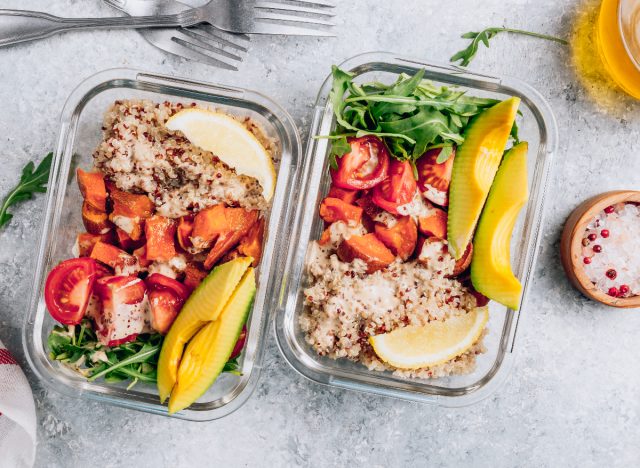
If you want to sculpt a leaner midsection, Amy Goodson, MS, RD, CSSD, LD, a registered dietitian and certified specialist in sports dietetics who sits on our Medical Expert Board, recommends balancing out your plate. “Focus on consuming nutrient-rich foods like lean protein, whole grains, fruit, vegetables, and healthy fat 80 to 90% of the time,” she says. “Then, save 10 to 20% for fun foods that likely shouldn’t be on your plate every day like foods with added sugar, fried foods, sugar-sweetened beverages, and desserts.” This is a smart eating habit to get into, as it can help you establish a calorie deficit, which will result in total-body fat loss.

Now is the best time to kick up your cardio game. Consider working regular cardio exercise into your routine, such as jogging, swimming, brisk walking, hiking, or even dancing. “Aim for at least 150 minutes of moderate-intensity activity, or 75 minutes of high-intensity activity every week,” Goodson instructs. “And better yet, if you can intertwine interval training, do it! This type of training typically burns more calories in a shorter period of time. Cardio activity helps burn calories to help reduce overall body and belly fat.”
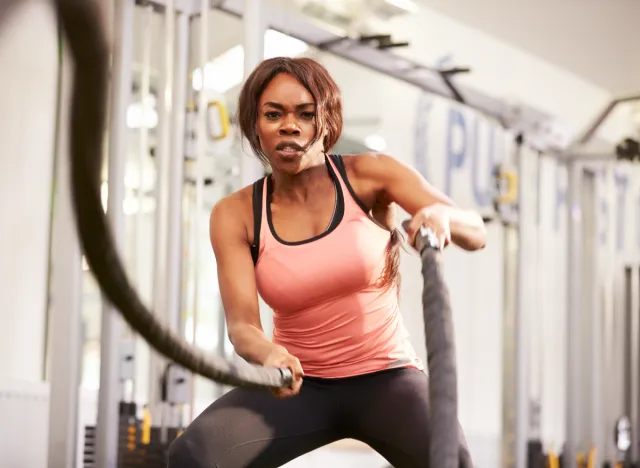
While we’re at it, let’s chat about high-intensity interval training (HIIT). According to Tyler Read, the founder of PTPioneer.com and a personal trainer who’s been involved in the health and fitness world for the past 15 years, HIIT is an excellent way to shrink your belly and get your health back on track.
“HIIT involves quick and very intense bursts of activity,” Read says. “It can burn a lot of calories in a short time, and studies have shown that it can be effective at reducing belly fat. An example of a HIIT workout might involve alternating between 30 seconds of sprinting and 30 seconds of walking, repeated for 10 to 20 minutes.”

Strength training is something Goodson and Read both stress the importance of. It’s necessary to establish a healthy balance of cardio and strength training within your workouts.
“Strength training actually helps keep your metabolism elevated longer throughout the day, plus it helps build muscle,” Goodson explains. “An elevated metabolism can help increase the amount of calories you burn over the course of the day leading to greater caloric deficit.”
Read suggests using a rep count between five and 12 to achieve the best results in your strength regimen.

Not only can chronic stress promote the accumulation of fat around your waistline due to a jump in cortisol levels, but it can also be a killer. Goodson suggests adding stress-reducing activities to your routine, such as yoga, deep breathing exercises, meditation, and/or carving out time for the hobbies you love most. Starting the morning off with mindful activities like writing in a gratitude journal and enjoying your favorite cup of tea can also be an excellent way to kick off your day on a positive note. Positive vibes attract positive vibes.

Sipping cocktails and your favorite wine is a sneaky little way to consume extra unwanted calories. “Alcohol adds more calories than people think to their eating routine,” Goodson tells us. “Over time, this can lead to weight gain, and often in the abdominal area. And let’s face it—the more you drink, the less you care about what you eat, which can potentially further increase your calorie intake.”
Moral of the story? Drink in moderation. And when you do head out to grab drinks with friends, be mindful of counting your overall calorie intake.
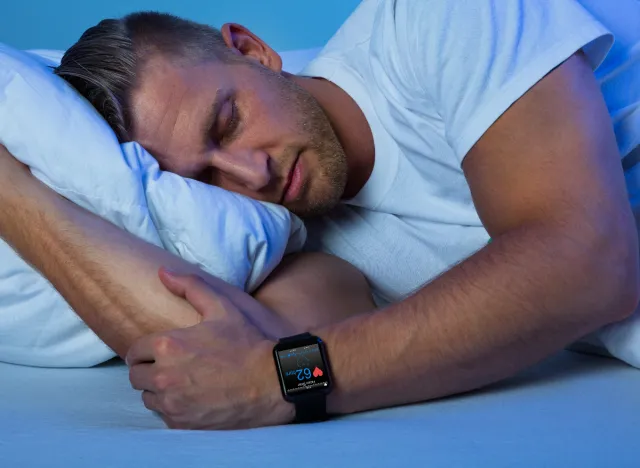
Did you know that how much solid sleep you get can play a critical role in getting rid of belly fat and your overall weight management? “The goal is to get seven to nine hours a night,” Goodson says. “Lack of sleep can lead to disrupted hormones related to appetite regulation, ultimately leading to increased hunger and cravings. When you feel tired, you often look for high-sugar and comfort foods to feel better, which typically have more calories. On the reverse, when you are rested, you are more poised to make better food choices and provide your body with foods that actually give you sustained energy!”
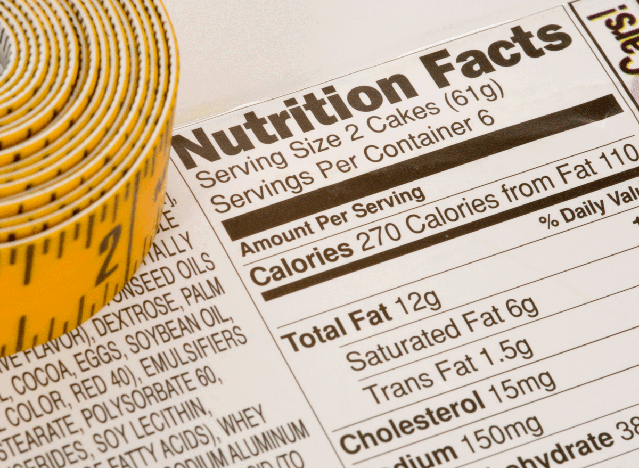
Trans fats are bursting with calories and can cause weight gain in your stomach, resulting in a greater amount of visceral fat when consumed in excess amounts, says Lisa Young, Ph.D., RDN, the author of Finally Full, Finally Slim, a nutritionist in private practice, and a member of our Medical Expert Board. Trans fats promote inflammation and an increase in LDL cholesterol, a surefire recipe for belly fat. Avoid them at all costs—choose healthier unsaturated fats instead.
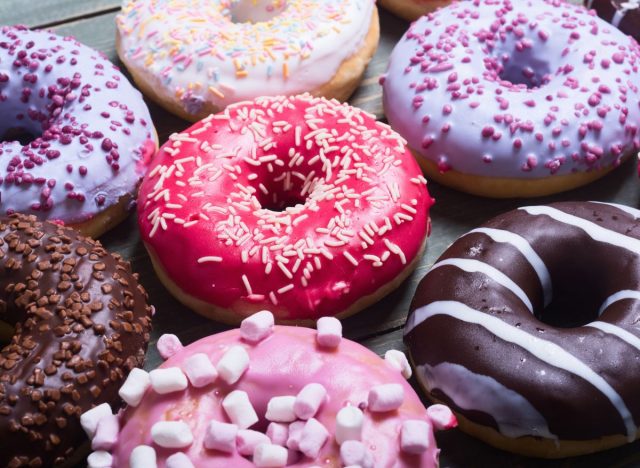
Ice cream, chocolate chip cookies, doughnuts, and pastries sure do taste delicious, but these sugar-filled treats are void of nutrients and aren’t doing your waistline any favors. “Reduce [your] consumption of sugary foods as they are calorie-dense and can contribute to the accumulation of fat in the abdominal area,” Young explains. “Sugary foods increase insulin levels which further promotes fat storage, specifically in the belly. [In addition,] high sugar intake plays a role in inflammation, as it is associated with insulin resistance and metabolic disorders. Fructose is often present in sugary foods which increases the production of triglycerides, a type of fat that accumulates in the abdominal area.”
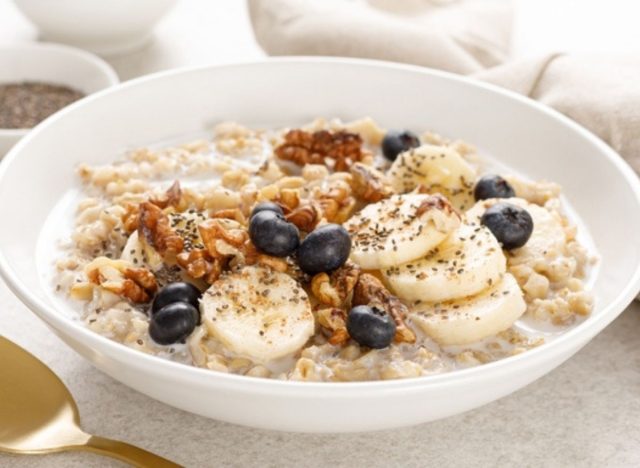
Tweaking your diet means making sure you’re getting enough protein and fiber. Consumption of protein and high-fiber foods can aid in your belly fat loss efforts and help you avoid further accumulation of abdominal fat.
“Eating protein increases satiety and reduces overall calorie intake, preventing overeating and excess belly fat. Furthermore, protein consumption plays a role in hormone regulation by reducing cravings and promoting appetite control,” Young explains. As for fiber, she adds, “Fiber plays a role in promoting a healthy gut and reducing inflammation, which decreases the risk of developing visceral fat.” Foods like veggies, fruits, and whole grains make you feel fuller for longer, and they come with a low calorie count.

